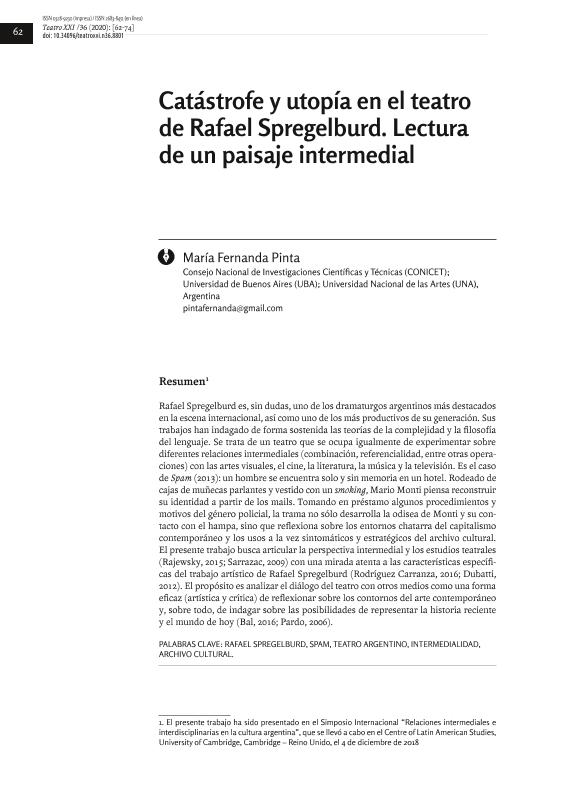Artículo
Rafael Spregelburd es, sin dudas, uno de los dramaturgos argentinos más destacados en la escena internacional, así como uno de los más productivos de su generación. Sus trabajos han indagado de forma sostenida las teorías de la complejidad y la filosofía del lenguaje. Se trata de un teatro que se ocupa igualmente de experimentar sobre diferentes relaciones intermediales (combinación, referencialidad, entre otras operaciones) con las artes visuales, el cine, la literatura, la música y la televisión. Es el caso de Spam (2013): un hombre se encuentra solo y sin memoria en un hotel. Rodeado de cajas de muñecas parlantes y vestido con un smoking, Mario Monti piensa reconstruir su identidad a partir de los mails. Tomando en préstamo algunos procedimientos y motivos del género policial, la trama no sólo desarrolla la odisea de Monti y su contacto con el hampa, sino que reflexiona sobre los entornos chatarra del capitalismo contemporáneo y los usos a la vez sintomáticos y estratégicos del archivo cultural. El presente trabajo busca articular la perspectiva intermedial y los estudios teatrales (Rajewsky, 2015; Sarrazac, 2009) con una mirada atenta a las características específicas del trabajo artístico de Rafael Spregelburd (Rodríguez Carranza, 2016; Dubatti, 2012). El propósito es analizar el diálogo del teatro con otros medios como una forma eficaz (artística y crítica) de reflexionar sobre los contornos del arte contemporáneo y, sobre todo, de indagar sobre las posibilidades de representar la historia reciente y el mundo de hoy (Bal, 2016; Pardo, 2006). Rafael Spregelburd is undoubtedly one of the most outstanding Argentine playwrights on the international scene, as well as one of the most productive of his generation. His work has steadily investigated the theories of the complexity and philosophy of language. It is a theatre that also concerned with experimenting on different inter-mediate relations (combination, referentiality, among other operations) with the visual arts, cinema, literature, music and television. This is the case of Spam (2013): A man wakes up in a hotel without memory. Surrounded by boxes of speakers dolls and dress with the tuxedo, Mario Monti plans to reconstruct his identity from the e-mail. Borrowing some procedures and motives of police genre, the plot not only develops Monti ́s odyssey and his contact with the criminal underworld, but also an interesting reflection about junk environments in contemporary capitalism and, at the same time, the symptomatic and strategic use of the cultural archive. The present work seeks to articulate the intermediate perspective and theatrical studies (Rajewsky, 2015; Sarrazac, 2009) with an eye on the specific characteristics of Rafael Spregelburd’s artistic work (Rodriguez Carranza, 2016; Dubatti, 2012). The purpose is to analyze the dialogue of the theatre with other means as an effective (artistic and critical) way to reflect on the contours of contemporary art and, above all, to inquire about the possibilities of representing the recent history and the world of today (Bal, 2016; Pardo, 2006).
Catástrofe y utopía en el teatro de Rafael Spregelburd: Lectura de un paisaje intermedial
Título:
Catastrophe & Utopia in Rafael Spregelburd ́s theatre: A reading of an intermedial landscape
Fecha de publicación:
10/2020
Editorial:
Universidad de Buenos Aires. Facultad de Filosofía y Letras. Instituto de Historia del Arte Argentino y Latinoamericano
Revista:
Teatro XXI
e-ISSN:
2683-8451
Idioma:
Español
Tipo de recurso:
Artículo publicado
Clasificación temática:
Resumen
Palabras clave:
Rafael Spregelburd
,
Spam
,
Teatro argentino
,
Intermedialidad
Archivos asociados
Licencia
Identificadores
Colecciones
Articulos(SEDE CENTRAL)
Articulos de SEDE CENTRAL
Articulos de SEDE CENTRAL
Citación
Pinta, María Fernanda; Catástrofe y utopía en el teatro de Rafael Spregelburd: Lectura de un paisaje intermedial; Universidad de Buenos Aires. Facultad de Filosofía y Letras. Instituto de Historia del Arte Argentino y Latinoamericano; Teatro XXI; 36; 10-2020; 62-74
Compartir
Altmétricas




